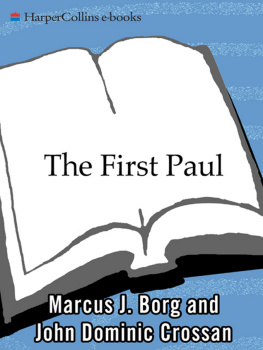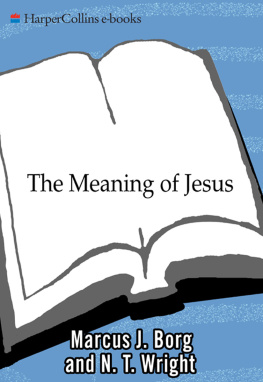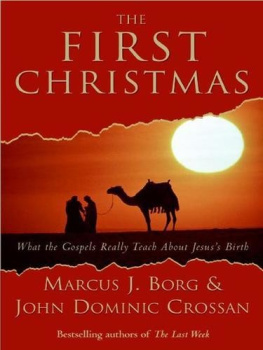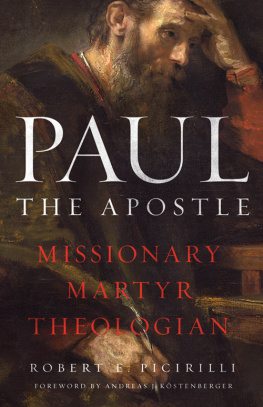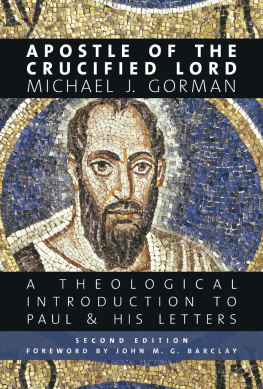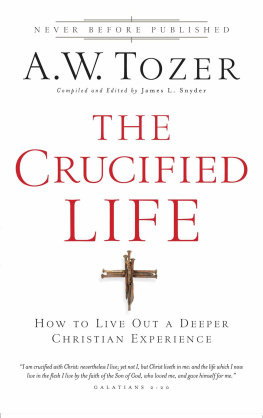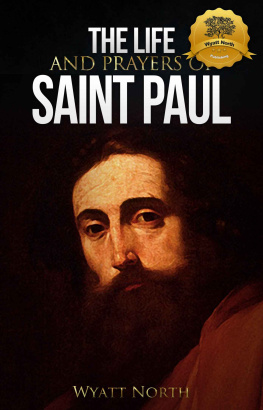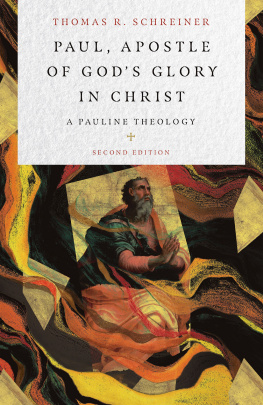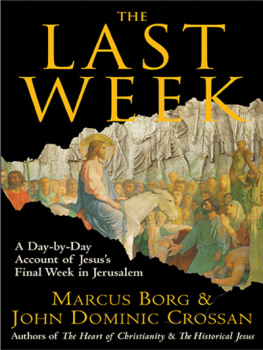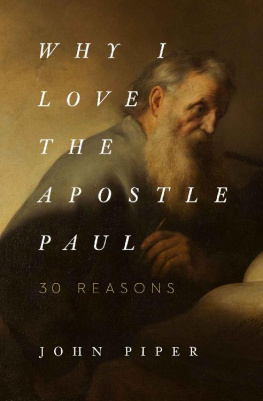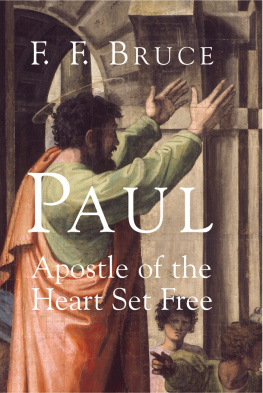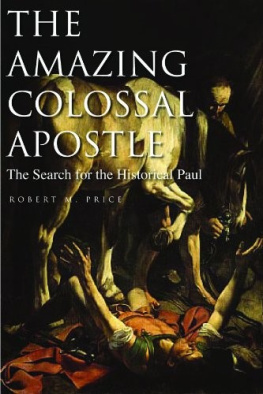Marcus J. Borg
John Dominic Crossan
PAUL: APPEALING OR APPALLING?
P AUL IS SECOND ONLY TO JESUS as the most important person in the origins of Christianity. Yet he is not universally well regarded, even among Christians. Some find him appealing, and others find him appalling; some arent sure what to think of him, and others know little about him.
The cover of Newsweek for May 6, 2002, asked, What Would Jesus Do? The story inside referred to Paul as well, citing passages attributed to him on slavery, anti-Semitism, misogyny, and heterosexism:
The Biblical defense of slavery is: Slaves, obey your earthly masters with fear and trembling, in singleness of heart as you obey Christ, writes Saint Paul. Anti-Semitism was long justified by passages like this one from I Thessalonians: the Jews killed both the Lord Jesus and the prophets. And the subjugation of women had a foundation in I Timothy: As in all the churches of the saints, women should be silent in the churches. If there is anything they desire to know, let them ask their husbands at home. For it is shameful for a woman to speak in church. And yet in each case, enlightened people have moved on from the worldview such passages express.
And if science now teaches us that being gay may be a natural state, how can a reading of the Bible, including Saint Pauls condemnation of same-sex interaction in Romans, inarguably cast homosexuality in unnatural terms?
These are among the passages in letters attributed to Paul that many find more appalling than appealing. So we begin our story of Paul by speaking about his importance, the reasons for his mixed reputation, and the foundations for our way of seeing him.
Pauls importance is obvious from the New Testament itself. There are twenty-seven books in the New Testament, though to call them books is a bit of a misnomer, for some are only a page or a few pages long. Of these twenty-seven, thirteen are letters attributed to Paul. Not all were actually written by Paul, as we will soon report, but they bear his name. To these add the book of Acts, in which Paul is the main character in sixteen of its twenty-eight chapters. Thus half of the New Testament is about Paul.
Moreover, according to the New Testament, Paul was chiefly responsible for expanding the early Jesus movement to include Gentiles (non-Jews) as well as Jews. The result over time was a new religion, even though Paul (like Jesus) was a Jew who saw himself working within Judaism. Neither intended that a new religion would emerge in his wake.
This does not mean that Christianity is a mistake. But it does mean that the two most important foundational figures of Christianity were Jews whose passion was the God and the people of Israel. When Paul spoke to non-Jews, it was to the God of Israel as disclosed in Jesus to whom he called them. Nevertheless, Paul more than any other figure in the New Testament was responsible for the emergence of Christianity as a new religion that, though it included Jews, became increasingly separated from Judaism.
Pauls importance extends beyond the New Testament into the history of Christianity. Many of its most important theologians and reformers were decisively shaped by Pauls letters. St. Augustine (354430) was converted to Christianity by a passage from Paul. Before his conversion he was a gifted, brilliant, and troubled young man who fathered a child with a woman to whom he was not married. His spiritual journey led him through philosophy to Manicheanism, a religion that emphasized that the flesh was bad and spirit was good.
Then one day, as Augustine tells the story, he heard a child singing, Pick it up, read it. He picked up a copy of the New Testament, and his eyes fell upon Romans 13:1314:
Let us livenot in reveling and drunkenness, not in debauchery and licentiousness, not in quarreling and jealousy. Instead, put on the Lord Jesus Christ
In his Confessions, commonly seen as the worlds first spiritual autobiography, he reports:
Instantly, as the sentence ended, there was infused in my heart something like the light of full certainty and all of the gloom of doubt vanished away.
After this experience mediated by Paul, Augustine became the most influential theologian of the first millennium of Christianity.
In the more than thousand years from Augustine to the Protestant Reformation of the sixteenth century, Paul continued to be revered because his writings were part of Christian sacred scripture. But during the Reformation, he became decisively important for Protestants. Martin Luther (14831546) had his transforming experience of radical grace while preparing lectures on Paul. Paul became the foundation of his theology, especially the Pauline contrasts between grace and law, and faith and works, language that has been paradigmatically important for Lutherans ever since.
John Calvin (150964), the other most important Protestant Reformer, also made Paul central to his theology. Calvins theological descendants include millions of Protestants: Puritans, Presbyterians, Baptists, Congregationalists (todays United Church of Christ), and other Reformed denominations.
Two centuries later, Paul played a central role in the birth of the Methodist church. Its founder, John Wesley (170391), was converted to his mission to reform the Church of England while listening to a reading of Luthers commentary on Pauls letter to the Romans. His lifes work eventually led to a new denomination, now the second largest Protestant denomination in America. Thus hundreds of millions of Protestants around the world, whether they know it or not, have Paul as their primary theological ancestor.
To say the obvious, Paul matters. But how he matters and how much he matters vary greatly among Christians. There are very diverse understandings of Pauls importance, message, and character. To some extent, the same could be said of Jesus, for he is diversely interpreted as well. But all Christians agree that Jesus was admirable, attractive, and appealing. Not so with Paul.
THE CATHOLIC PAUL AND THE PROTESTANT PAUL
Catholics and Protestants see Pauls importance quite differently. For Protestants (at least historicallywere not sure about the present), an interpretation of Pauls theology and language is foundational for understanding Christianity. Not so for Catholics. Though they see Paul as a saint and his letters as sacred scripture, they have not made Paul central in the way that Protestants have. This difference can easily be seen in the history of Protestant and Catholic theology since the Reformation. But we illustrate it by speaking autobiographically.
Borg: In the Lutheran form of Christianity in which I grew up, Paul was more important than Jesus. Of course, none of my pastors or Sunday school teachers ever said this. Indeed, they would be puzzled by the statement. But as I look back on my experience of growing up Lutheran, it is clear that I was taught to see Jesus, God, and the Christian gospel through a Pauline lens as mediated by Luther. I was blissfully unaware of this, of course. I took it for granted that our way of seeing Jesus, God, and Christianity was not a way of seeing them, but the way.

